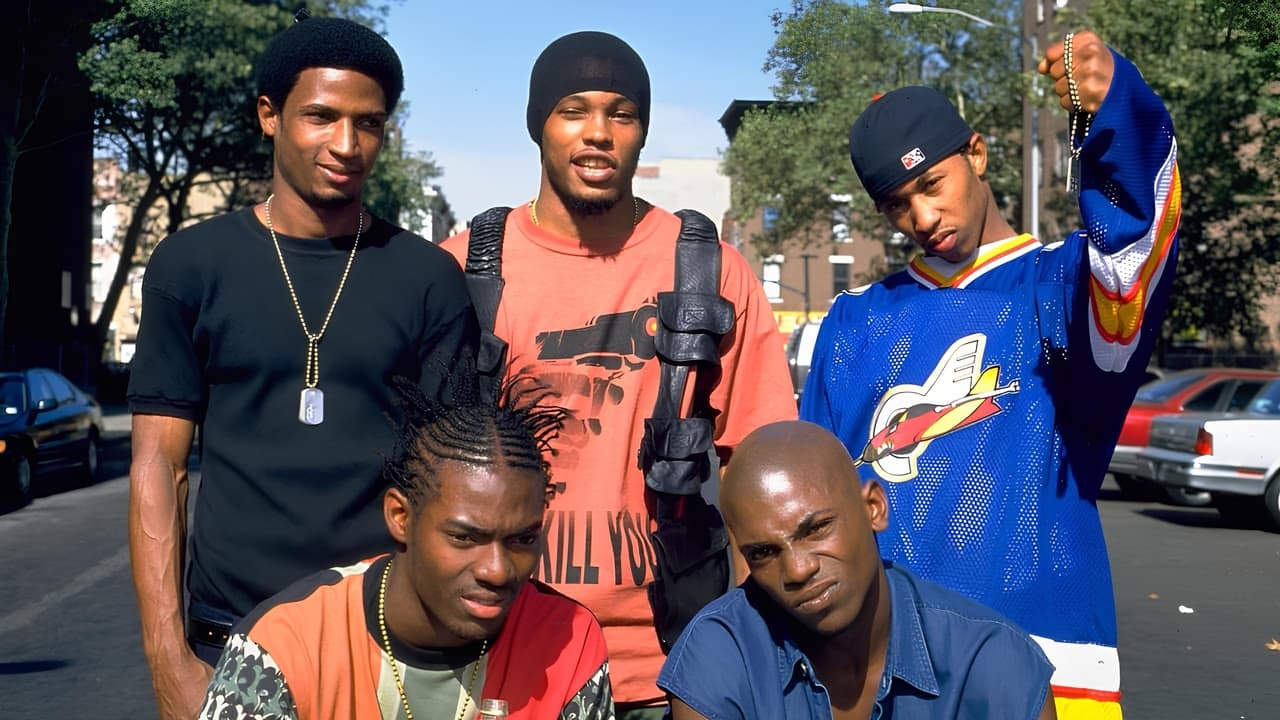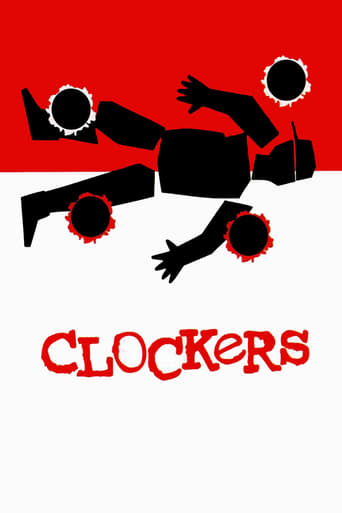



good back-story, and good acting
This is a small, humorous movie in some ways, but it has a huge heart. What a nice experience.
View MoreThe movie is wonderful and true, an act of love in all its contradictions and complexity
View MoreThis film is so real. It treats its characters with so much care and sensitivity.
View MoreI think this is one of Spike Lee's best films - it deftly balances a compelling murder mystery with a wider portrait of the people, both innocent and less so, whose lives are warped by their community's decay in ways both obvious and subtle. The movie juggles a cast of a round dozen characters seemingly effortlessly, and with enough skill and density that you feel like you know them far better than their actual screen time would warrant. The cast is first-rate, the acting is excellent, the direction keeps the story moving at an exciting clip, and the music is a perfect balance of hip-hop beats with a more traditional score.Clockers keeps your attention with remarkable shots of the projects, excellent background music that rarely interferes with your ability to hear what's being spoken, and convincing acting that portrays the projects and the problem of drug crime exactly they way they exist in real life. Indeed, the film opens with actual photos of persons who were gunned down in drug wars along with murals on walls hoping that the departed rest in peace. Moreover, Clockers is not for children; nor is this film for the squeamish. There's a good deal of violence and blood; but the realism raises Clockers up to a five star high level of motion picture. Clockers also provides us with excellent social commentary about the remarkably harsh and brutal world of drug dealing.Overall rating: 8 out of 10.
View MoreIn the fall of 1995, I found myself in the city of Grand Rapids, Michigan (on a weekend leave from college) highly anticipating the newest Spike Lee film. Later that night, I viewed it in a large cineplex with possibly 20-25 screens. There were other action films, comedies, and dramas that I could have chosen from, but I had to see Lee's latest outing. He was a controversial director back then and still reins as one today. In the 90's, his films were a bit more mainstream than they are now. To me, they were like events. And after watching the trailer for Clockers, I knew I had to get to a viewing on opening night. Slightly disjointed, messy at times, yet totally absorbing, Clockers remains one of Spike Lee's most interesting and most forceful cinematic feats. It holds a varied cast of actors known and unknown (I'm just speculating but I think a lot of the people on screen were plucked off the street without any acting experience thus adding to the film's realism), a plethora of varied styles of directing, a fantastic opening credit sequence, and a massive need to get its message across. With most of Spike's films, you generally see a sort of sporadic narrative. Clockers has this but it still manages to be a solid helping from the Brooklyn- rooted director. Produced by legendary filmmaker Martin Scorsese and based on a novel of the same name by Richard Price (he wrote the screenplay as well), Clockers tells the story of a small-time drug dealer named Ronald "Strike" Dunham (played by Mekhi Phifer who at the time, had never acted in a film before and got picked out of 1,000 people in an open casting call). He works with a bunch of other fellow dealers who are labeled "Clockers" (they are basically 24 hour drug pushers). When "Strike's" brother Victor Dunham (played by Isaiah Washington) is accused and confesses (in self defense) to murdering one of "Strike's" rival dealers working at a fast food restaurant, "Strike" is then somehow caught up in the whole investigation. He's pulled in different directions and has to take sides. This is based on his relentless pursuers being a morally concerned cop named Rocco Klein (played by Harvey Keitel who gives a Harvey Keitel-like performance) and a parasitic drug lord named Rodney Little (Oscar caliber stuff from Delroy Lindo). A couple of things to note about this film: the acting by the entire cast down to the bit players, the supporting players, and the leads is sensational in every way. Second: the drug solicitation scenes that are featured at various intervals are disturbingly real and authentic. As you view them, it feels less like you're watching a movie and more like you're experiencing real life as it happens. Registering at a running time of just over 2 hours, it's safe to say that there is a lot of movie to take in with Clockers. This vehicle is a character study, a drug flick, and a murder mystery all in one. You have a meaty script by Richard Price (he wrote The Color of Money and Ransom), a searing musical score from Terrence Blanchard (he's Lee's right hand man when it comes to musical scores), and an extremely dark- hued look from cinematographer Malik Hassan Sayeed. In essence, Spike Lee has every resource possible to flex his directorial wings. This is in my mind, one of the strongest turns he has ever put in as a director. His technique is exuberant. You get a lot of slow motion scenes (set to music of course), a shot that pans over the view of one of the film's most pivotal moments (a protective murder of a burnt out drug addict by a young boy), some solid jump cuts (at the beginning during one of the drug deals), and high energy flashbacks that are quick and to the point. A lot of the film's best sequences are not only set to Blanchard's score, but also to a mixed pop soundtrack with songs from Seal, Crooklyn Dodgers, Chaka Khan, and Rebelz of Authority.In conclusion, this is a heavy urban crime drama with powerfully realized, individual scenes. Clockers is no doubt, a solid interpretation of Lee's rather large body of work. He tries hard to be a good storyteller and sometimes slips a bit. But somehow someway, he still gets the job done here. The film's last ten minutes, which feel subdued, project a bit of a relief from all the chaos that came before it. They faithfully channel a feeling of radiant hope. This reassures the viewer that an exercise this depressing and melodic, can still end on a positive note. With that said, Clockers for me, was definitely worth a re-viewing. It's a Spike Lee Joint that "clocks in" as something I would wholeheartedly recommend.
View MoreYoung drug pushers in the projects of Brooklyn live hard dangerous lives, trapped between their drug bosses and the detectives out to stop them.When watching this film, knowing it first went through the hands of Martin Scorsese, one cannot help but wonder how Spike Lee does it different than Scorsese would. The obvious answer is that Lee is able to provide an authenticity that Scorsese may not have. While it is not true that only black men can tell the stories of other black men, but few handle the material like Lee does. Scorsese would likely have shifted the emphasis to Rocco Klein, the white cop.And that would have worked, as well. Klein (played by Harvey Keitel) is the co-protagonist, as his search for the killer is an important plot point. Roger Ebert says, "He is a weary professional who acts as a witness to death. There is a tendency in his business not to linger too long over the death of one young drug dealer, but he cannot get stubborn questions out of his mind." Keitel does a fine job in this role, and it is nice to see him take his gritty gangster image and put a spin on it towards law enforcement.
View MoreDope dealing on the Nelson Mandela projects in Brooklyn is the everyday bread of local hoodlum Ronald Dunham aka Strike (Mekhi Phifer). Staking the local park the line of work is relentlessly stressful causing a stress-induced ulcer, which he deals with by drinking down yoo-hoos by the litres. At night respite is found in the form of a trainset hobby, an voyeuristic escape from the reality he has accepted. When his boss Rodney Little (Delroy Lindo) hints towards the necessity of cropping one of his less trustworthy workers Strike confides to his brother Victor (Isaiah Washington). Soon after the murder is committed and Victor steps up to claim self defence. However hardliner detective Rocco Klein (Harvey Keitel) quickly assumes this is a cover up for the true culprit.One of Spike Lee's most accomplished works and a worryingly underrated gem bordering on a masterpiece. While showing artistic restraint in symbols and style, Spike Lee offers a well-devised structure, which lets the strength of the story carry itself. Especially in the final act Lee's well-tuned reserve makes for a heart-felt conclusion full of poignant suggestions, as to the nature of violence. Even the innocent can be corrupted needing a vent for their endless victimisation, while the corrupt seek innocence by befriending children reminiscent of them in their youth and dreaming about a life with 'no more packing'. The ultimately compassionate Rocco, previously shown as a no nonsense cop with a strong moral compass ultimately rejects 'Justice in Black and White', deciding that even the guilty are seldom dealt justice and takes on the role of a benevolent judge and jury - the antithesis of Dirty Harry and Judge Dredd, one more attuned to understand human faults, accept them, than issue warrants. Nonetheless this self-conscious style of storytelling does backlash during build-up, as the convoluted plot mires midway with mild bouts of oversentimentilisation and underwritten character motivations, before finally hitting back with an astoundingly well-rounded finale. Nonetheless a brilliant and captivating movie, which ranks up there with Spike Lee's best with high probability of future rewatching pleasure. A big part of the success comes from disposing of the preacher like stance so predominant in many of Lee's weaker works.Albeit mostly low-key and pretty standard the most significant scenes feature sudden detachment from traditional cinematography to a more detached, surreal focus, as if suggesting a detachment from the grim everyday reality of the protagonists offering escapist release from hardships. This offers some extremely imaginative cinematography by Malik Hassan Sayeed.
View More